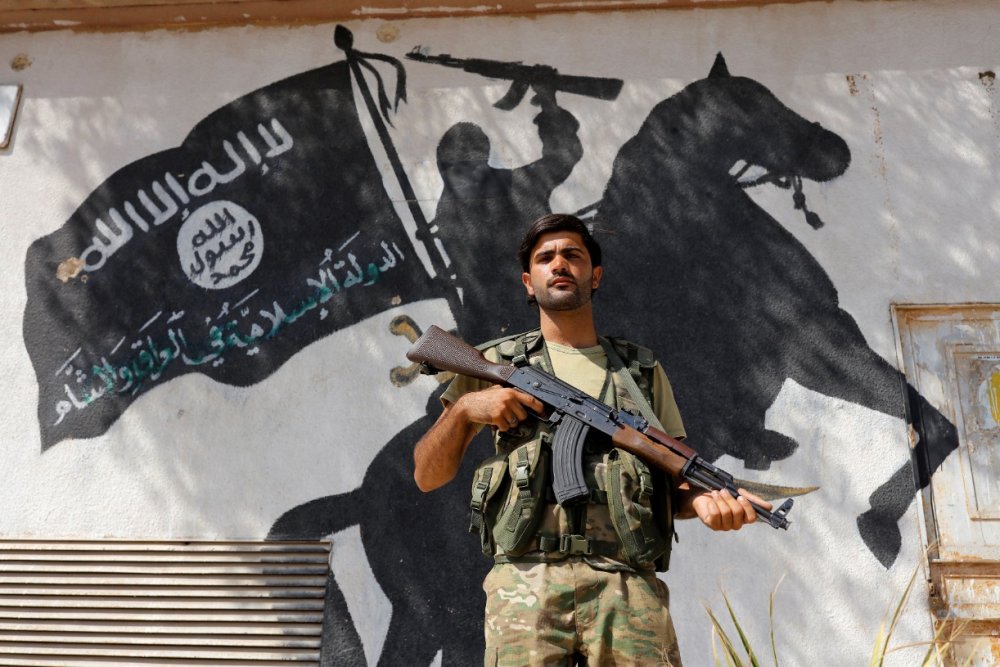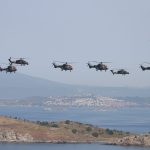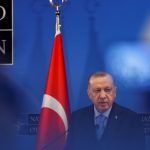Turkey has borrowed from the Kremlin’s playbook and is using PMCs to revive its Islamist credentials from Libya to Qatar and Malaysia.
Mercenaries have been around for some time, but while their purpose—guns for hire—has remained largely stagnant for decades, they are now being employed as instruments of foreign policy by several countries. The Russian Wagner Group, a quasi-private military company (PMC), has been rewriting the rules of the game and expanding Moscow’s footprint in the Middle East, Africa, Southeast Asia, South America, and, most recently, Ukraine.
Closer to home, Turkey has borrowed from the Kremlin’s playbook and is using PMCs to revive its Islamist credentials from Libya to Qatar and Malaysia. This is a significant adaptation of Russia’s playbook, with implications for the Middle East and North Africa (MENA) region to Southeast Asia. While Russian PMCs are motivated by money in carrying out the Kremlin’s objectives, their Turkish equivalents are driven by the belief that it is their duty to spread Islamist aims—or, at least, Islamist aims as defined by Ankara: assertive engagement, often in areas of former Ottoman influence.
An Islamist Equivalent?
Just as the Wagner Group’s future is closely linked with Russian president Vladimir Putin, the Turkish private military and security sector is closely linked with the country’s strongman, President Recep Tayyip Erdogan. While Putin envisions a new Russia rooted in Eurasianism, Erdogan has his eye on global Islamic leadership.
Ömer Taspinar, a security expert on Turkey, explained it thus: “At peace with Turkey’s Muslim heritage and multiple identities, neo-Ottomanism is also much more ambitious and idealistic than Kemalism in projecting Turkey as a regional superpower.” Following the 2011 Arab Spring, Turkey seized the moment to expand its influence in the region.
Today, Turkey’s PMCs are another tool in the expanding arsenal of President Erdogan’s assertive neo-Ottoman vision of the world. The unique characteristic of Turkey’s leading PMC, Sadat International Defense Consultancy, is that it could combine an “army for hire” with an “off-the-shelf air force” armed with the already-famous Bayraktar drones. Turkish drones from the Middle East to Ukraine have shown how affordable combat drones (UCAV) can offer effective off-the-shelf airpower. Combining both options makes Turkey an attractive proposition for Islamic countries with a need to augment their security.
As with the Wagner group, the PMC label is also a convenient and efficient way for Turkey to develop a government-aligned paramilitary structure. Sadat, founded by retired Brigadier-General Adnan Tanriverdi, hews closely to the ideological path laid by Erdogan’s Islamist government, and is at the center of an ongoing debate in the West regarding its role as a shadow operator for Turkey’s non-official maneuvers.
The July 2016 failed Turkish coup had a notable side-effect: It gave rise to Turkish PMCs and paved the way for them to play a more prominent role in Ankara’s foreign policy. The idea of Sadat came to Tanriverdi during the Yugoslav wars. At that time, he was part of a visiting delegation to Bosnia-Herzegovina, and was against the idea of the West controlling the Bosnian Army, which he viewed as a step towards allowing Western private defense companies to turn neighboring Muslim states into enemies. Tanriverdi is quoted on the Sadat website:
Although its geography is covered with forests and has mountainous terrain, we learned that the Bosnian Army was transformed into a structure dominated by armored units and tanks by the company in question. However, the Bosnian Armed Forces should have consisted of units capable of performing commando and air-mobile operations in accordance with the country’s lands. But since the cost of forming these units would be less, it would not be in accordance with the interests of the private company and the country behind it,
The path from Tanriverdi’s idea of an Islamist PMC in Bosnia to the creation of Sadat and its expanding footprint in the Middle East is intertwined with Erdogan’s rise and the retired general’s elevation into his inner circle. Since the 2016 coup, Sadat has been at the forefront of many of Erdogan’s initiatives. In 2019, a Turkish opposition party called for an investigation of Sadat’s activities on different fronts, ranging from alleged military operations against the YPG in Syria to rumored paramilitary training camps in Turkey for AKP militants, who are used to enforce Erdogan’s policies and quell any signs of unrest. Sadat denied any involvement, and Ankara refused to comment despite multiple press inquiries.
The company’s website, however, removes any doubt about its aims. It says: “Sadat Inc. aims at establishing the cooperation among the Islamic Countries in the sense of military and defence industries, in order to assist the Islamic World to take the rank it deserves among the Super Global Powers as a self-sufficient military power.”
In a declaration published in March 2022, Ali Coşar, a retired colonel and Sadat board member, summarized the scope of establishing the Joint Defense Industry Cooperation of Islamic Countries from Qatar to Malaysia: “…to play a catalyst role in developing the Islamic Countries’ defense industry cooperation environment.”
Writing on Sadat, Major Matt Powers, an active duty officer serving on the U.S. Army’s Joint Staff, observed that “despite a diverse and often provocative body of reporting, Sadat is best understood as a modern example in the evolution of the privatized military industry, serving as an indigenous Turkish alternative to both Western and Russian companies.” Thus, while Wagner and similar Russian PMCs are composed of contractors that share Putin’s Eurasian vision, monetary gain is their main motivation. Sadat, on the other hand, is the manifestation of Tanriverdi’s vision of an Islamic army that is motivated by religious values first.
Nevertheless, the Wagner playbook from the Middle East to Africa has shown several valuable lessons to Ankara. Over the last decade, Russian mercenaries provided a cost-efficient and flexible force for achieving Moscow’s geopolitical objectives when the cover of plausible deniability was required. Also, the Wagner model is an efficient way to avoid sanctions while lining the pockets of the Russian elite. As the Russian Army is bogged in what will be a lengthy war of attrition in eastern Ukraine, Russia’s quasi-PMCs are acting as the Kremlin placeholder in natural resource-rich African countries, being paid locally by cash or in precious metals.
Islamist Expansion Under the Neo-Ottoman Banner
Now, Sadat’s footprint is growing in Syria, Libya, Nagorno-Karabakh, and Qatar, but Ankara has refused to admit to any official involvement—a response similar to Russian foreign minister Sergey Lavrov’s statement that Mali’s choice of the Wagner Group is a private business transaction. The Jerusalem Institute for Strategy and Security and Abu Dhabi’s TRENDS Research & Advisory assert that, over the last decade, Turkey has had a large pool of well-trained, easily deployed, and effortlessly disposable proxy forces as a tool of power projection, with a convenient degree of plausible deniability. The researchers concluded that when combined with Turkish non-official but government-directed and well-established groups such as the Gray Wolves—an ultra-nationalist paramilitary group—it is clear that Erdogan now has a private military and paramilitary system at his disposal.
Based on Turkey’s declared—and undeclared—foreign policy goals, an Islamist expansion under the neo-Ottoman banner in Afghanistan and Somalia are the next logical steps. As soon as the United States fled Kabul, Ankara moved in to propose that Turkish private military contractors be used to provide security. The same modus operandi was used in Mogadishu.
According to Coşar, Turkey will need to support building a new Afghanistan run by the Taliban in cooperation with Pakistan, Qatar, and Malaysia. Coşar, quoted on the website of Turkey’s Association of Justice Defenders Strategic Studies Center (Assam), notes the historical parallel between modern Taliban religious warriors and Seljuk and Ottoman Turks in following Sharia law during their rule. He considers the Taliban “the 21st century’s religious warriors who once again prioritised asymmetrical warfare and embraced martyrdom and becoming veterans for their homeland, and prevailed over the conventional superpowers backed by special forces in the mountainous Central Asian terrain.” It is not by chance that Tanriverdi is Assam’s president.
Also, the choice of the three countries to aid in this effort—Pakistan, Qatar, and Malaysia—is not by chance. Pakistan’s relationship with Turkey is improving since Ankara agreed to build an industrial production line for combat drones in Islamabad, arguably in exchange for an entry point into Afghanistan. Qatar is not only a supporter of Turkey’s expansion of influence in North Africa, but also a long-time recipient of its military equipment, support, and training. Security for the upcoming football World Cup has been outsourced to Turkish police and PMCs, for instance.
Malaysia is another Muslim country where Turkey aims to expand its sphere of influence. In 2019, following Erdogan’s visit to the country, both heads of state agreed to fight Islamophobia and set up a joint TV network or communication center. A year later, Turkish foreign minister Mevlut Cavusoglu mentioned that the Turkish defense industry sector is closely interested in competing in Malaysian defense tenders. Compared to the other countries where Turkish PMC activity is evident, Malaysia barely registers, though there have been increasing mentions of it in various communique and on social media. Concrete proof of Sadat’s activities in Malaysia remains scant. Nonetheless, it cannot be discounted that the country is the logical gateway to Southeast Asia for Turkish PMCs which aim to provide training services.
Malaysia’s ties with Turkey go back a long way. In the Ottoman era, Johor’s Sultan Abdul Bakar had close personal ties with the empire’s ruler, for example. The 2019 KL Summit was also seen by some as an attempt by Turkey, Qatar, and Malaysia to create an Islamic bloc to rival a Saudi-led one, an option that looks less probable as time passes. Nevertheless, both countries have increased cooperation significantly, particularly in the defense and economic sectors.
Also, Turkey and Malaysia share similar positions on the Palestinian issue and Hamas. Erdogan openly supports Hamas, although the recent thaw between Turkey and Israel has led to the expulsion of several of the Palestinian group’s activists. Malaysian leaders have also hosted Hamas leaders in Putrajaya, while former Prime Minister Najib Razak became the country’s first leader to visit Gaza. Much has also been written about the training of Hamas operatives in Malaysia, and recent reports have speculated that the group is eyeing the country as a possible operations base after coming under pressure in Turkey.
Ineffective Sanctions Prompt More Deployments
While Ankara, Sadat, and other Turkish PMCs are denying any involvement in recruiting and deploying mercenaries to fight abroad, security and military experts from the West beg to differ. The Western narrative on Sadat frames the company as a conduit between Ankara and Syrian proxy fighters, linking the Turkish military and security services to combat actions perpetrated by Syrian mercenaries from Libya to Caucasus, while giving Ankara room to deny any official involvement in them.
Turkey realized early on that the careful deployment of mercenaries, from riflemen to special operations units, in important geostrategic areas allowed it to establish beachheads in such countries and send a message to competing powers. At the same time, using such forces limited domestic opposition to putting regular Turkish troops in harm’s way.
Another variable that is helpful to forecast an increased use of mercenaries by Turkey is the limited effect of sanctions.
The international community considered economic sanctions a viable tool to contain Wagner’s expansion in the MENA region. The increasing footprint of the group in Africa has resulted in tighter sanctions from the United Nations, the United States, and Europe. Sixteen European governments, including France, the United Kingdom, Italy, and Germany, cited the involvement of the Russian Federation in providing matériel in support of the Wagner Group’s deployment in Mali, and called on Moscow to revert to responsible and constructive behavior in the region.
Unfortunately, sanctioning a group that is defined as a private company in a non-liberal market economy is a daunting task, especially considering that, even in Russia, private military operations are ostensibly illegal.
Ineffective Western efforts to quell the Wagner Group using economic sanctions have provided Ankara with a straightforward cost-benefit analysis: Deploying mercenaries and PMCs is not going to generate a significant backlash.
Country Risk Indicators and the Mercenaries’ Variable
From the Middle East to the African continent, Russia’s limited but tactically efficient quasi-PMCs enable Moscow to achieve long-term strategic objectives, from expanding its geopolitical sphere of influence to acquiring natural resources and widening the market for its arms. Ankara is taking notes.
Mercenaries and soldiers for hire are not a piece of news in Turkey. Looking at Ottoman history, the image of janissaries is the first to come to mind when looking at foreign professionals specializing in waging war. Yet, comparing the contemporary Turkish PMCs to the Ottoman Empire’s janissaries is beguiling but misleading. From the fifteenth to the nineteenth centuries, the Ottoman army used different types of mercenaries defined by their geographical origin or the task they were paid to accomplish. An example is related to the Okaban, a kind of combat engineer corps that was tasked to build roads and bridges and the related logistic support when the Ottoman army was on the move. Similarly, the famed and feared Ottoman artillery counted on Hungarian and other European specialists’ siege expertise, while the janissaries were part of the standing army.
As happened in the past, it is also essential not to overstate each mercenary unit’s capabilities. One truth from history will still hold: Winning or losing are both bad outcomes for them. In The Prince, Niccolo Machiavelli observed that losing is bad because they end up dead, and winning is also a negative outcome because it will end their business. On the same line, the seventeenth-century Ottoman chronicles mention that mercenaries are a financial menace to the empire’s stability.
Hence, private military companies are mainly deployed to preserve insecurity. Russia pioneered the use of mercenaries as a valuable tool in pursuing its foreign policy aims. Turkey is following closely the Russian playbook, fine-tuning such tactics to suit its own purposes. Turkish and Russian use of “manageable chaos” in neighboring countries to their advantage will likely have to be accounted for with greater urgency in threat spectrum assessments.
By: Dr. Alessandro Arduino – the principal research fellow at the Middle East Institute, National University of Singapore (NUS). He is an associate at Lau China Institute, King’s College London. His most recent book is China’s Private Army: Protecting the New Silk Road (Palgrave, 2018).
Image: A member of Turkish-backed Free Syrian Army (FSA), seen with a mural of the Islamic State in the background, stands guard in front of a building in the border town of Jarablus, Syria, August 31, 2016. Reuters/Umit Bektas
Source: National Interest



